Is your tap water toxic? How to choose the best water filters

In This Article
Just because tap water in the United States or elsewhere is legal to drink does not mean it is safe or healthy. From microplastics, lead, chlorine, and heavy metals to bacteria and hormone-disrupting chemicals, there is a lot that can end up in your freshly-poured glass. It is important to know what's in your water and how to filter it out.
If you care about the products you put on your body, such as shampoos, deodorants, laundry detergents, and makeup, and the food you eat, such as quality meats and organic vegetables, you should care just as much about what you drink. That includes water for drinking, cooking, showering, and washing your hands. Filtering it to remove harmful ingredients is one of the simplest ways to protect your health.
Protecting yourself from tap water contaminants is your responsibility. Sadly, the EPA allows certain levels of regulated contaminants even when research shows those levels can still be harmful!
If you are feeling a little overwhelmed at the thought of choosing another product, don't worry, as we've researched for you. I’ve found the best water filters, pitchers, and even shower and sink filters so you can cover every source of water in your home affordably and effectively.
Best overall water filter: AquaTru Classic Countertop Water Filter
Best countertop water filter: Aquasana Clean Water Machine
Best pitcher water filter: Clearly Filtered
Best shower water filter: AquaBliss
Best filtered water bottle: Lifestraw Go Series
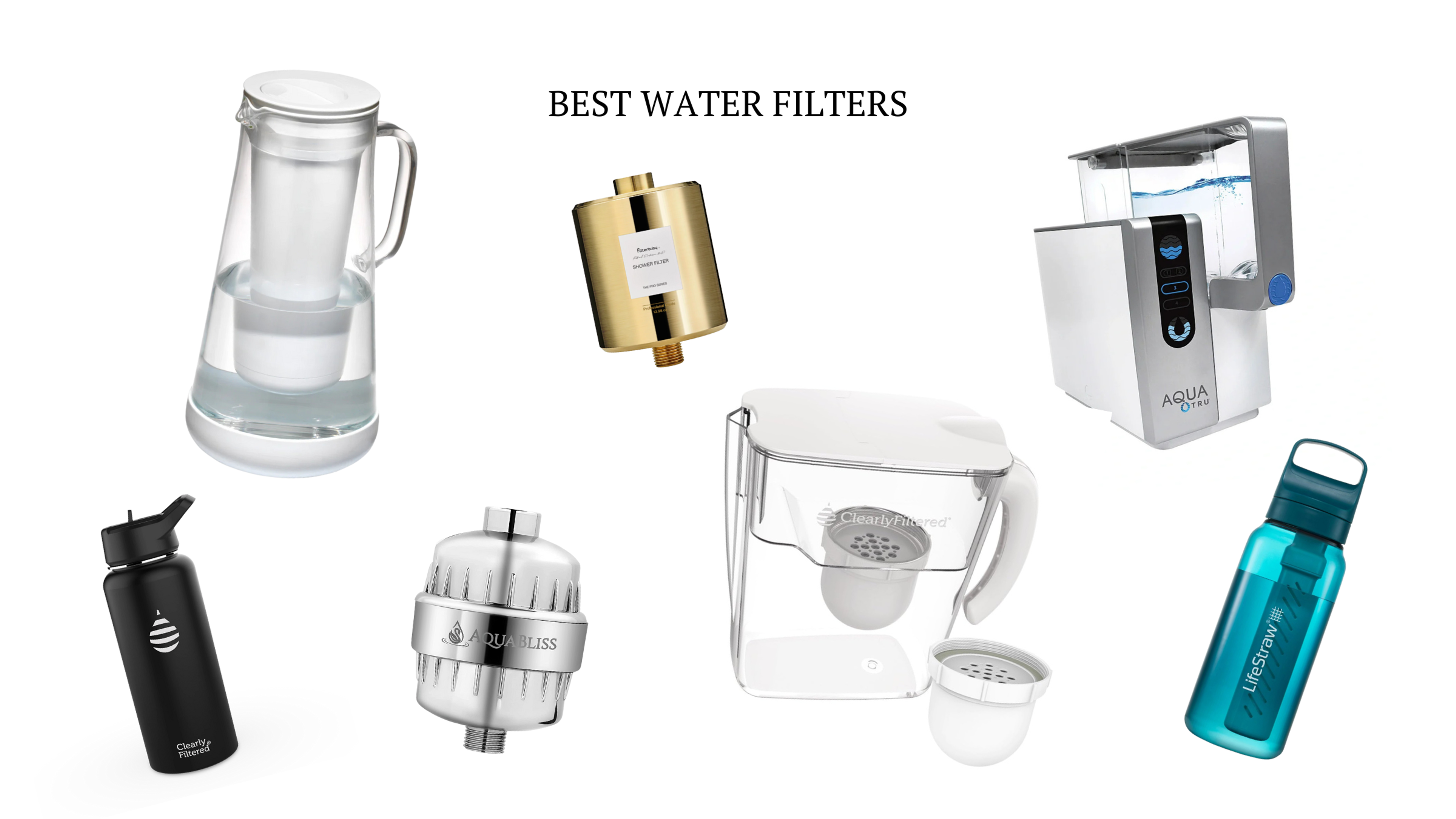
Why filtering your water matters
Contaminants add up over time. Even small amounts can accumulate in your body, causing long-term harm. Reducing your exposure now is far better than dealing with the effects later.
According to the EPA, common contaminants in U.S. tap water include:
- Microplastics
- Chlorine
- Fluoride
- Lead
- Arsenic
- PFAS (“forever chemicals”)
- Pharmaceuticals
- VOCs
- Heavy metals
- Disinfection byproducts (THMs, HAAs)
Other harmful substances often found in tap water:
- Pesticides and herbicides
- Chromium-6 (linked to cancer and birth defects)
- Flame retardants
- TCE (a cancer-linked solvent)
- Parasites and bacteria
- PFOA (Teflon)
- Radiation
These contaminants can disrupt hormones and your endocrine system, harm digestion, impair neurological development, cause fertility problems, damage hair and skin, and even increase cancer risk (such as the link between PFAs and cancer). In fact, a study from 2023 found that exposure to chemicals commonly found in drinking water and everyday household products may result in reduced fertility in women of as much as 40 percent! If that’s not convincing enough to start filtering your water, I don’t know what else to say.
However, it’s important to note that occasional exposure isn’t usually the issue; it’s repeated exposure over time that causes problems.
To me, the risk is not worth it. While the occasional cup of tap water won’t do damage, it’s better to decrease repeated exposure where and when you can.
How do water filters work?
Most water filters remove impurities by forcing water through porous materials that trap contaminants. There are three main methods:
Mechanical filtration uses a physical barrier (like a membrane or mesh) to catch larger particles such as sediment, dirt, and rust.
Chemical filtration uses materials that chemically interact with impurities. Activated carbon is a common example—it absorbs chlorine and other chemicals effectively.
Reverse osmosis is an increasingly popular and highly effective method for filtering your water. It uses pressure to push water through a semi-permeable membrane with pores small enough for only water molecules to pass through, removing contaminants like lead, VOCs, PFAS, and arsenic.
How to remove toxins from your water (in 4 steps)
Before I get into all my recommendations for best water filters from countertop dispensers to pitchers to water bottles, please note that not every area of the country is one size fits all with your water filter. Not all areas have the same contaminants. The right filter for you depends on your local water quality.
Step 1: Test your water
Find your local water quality report by searching “[City, State] water quality report [Year].” Review it yourself or have a water specialist interpret it. For water wells, use a well water test kit or call the National Testing Laboratories at 1-800-458-3330.
Step 2: Research filters
Base your choice on the contaminants found in your water and your budget. More expensive doesn’t always mean better.
Step 3: Compare options
Decide between countertop, under-sink, reverse osmosis, pitcher, or shower/bath filters based on your needs, health concerns, filtration requirements and budget.
Step 4: Invest in a water filter!
Enough said! Buy a water filter and start using it.
So, let’s get into my recommendations.
Top recommended water filters
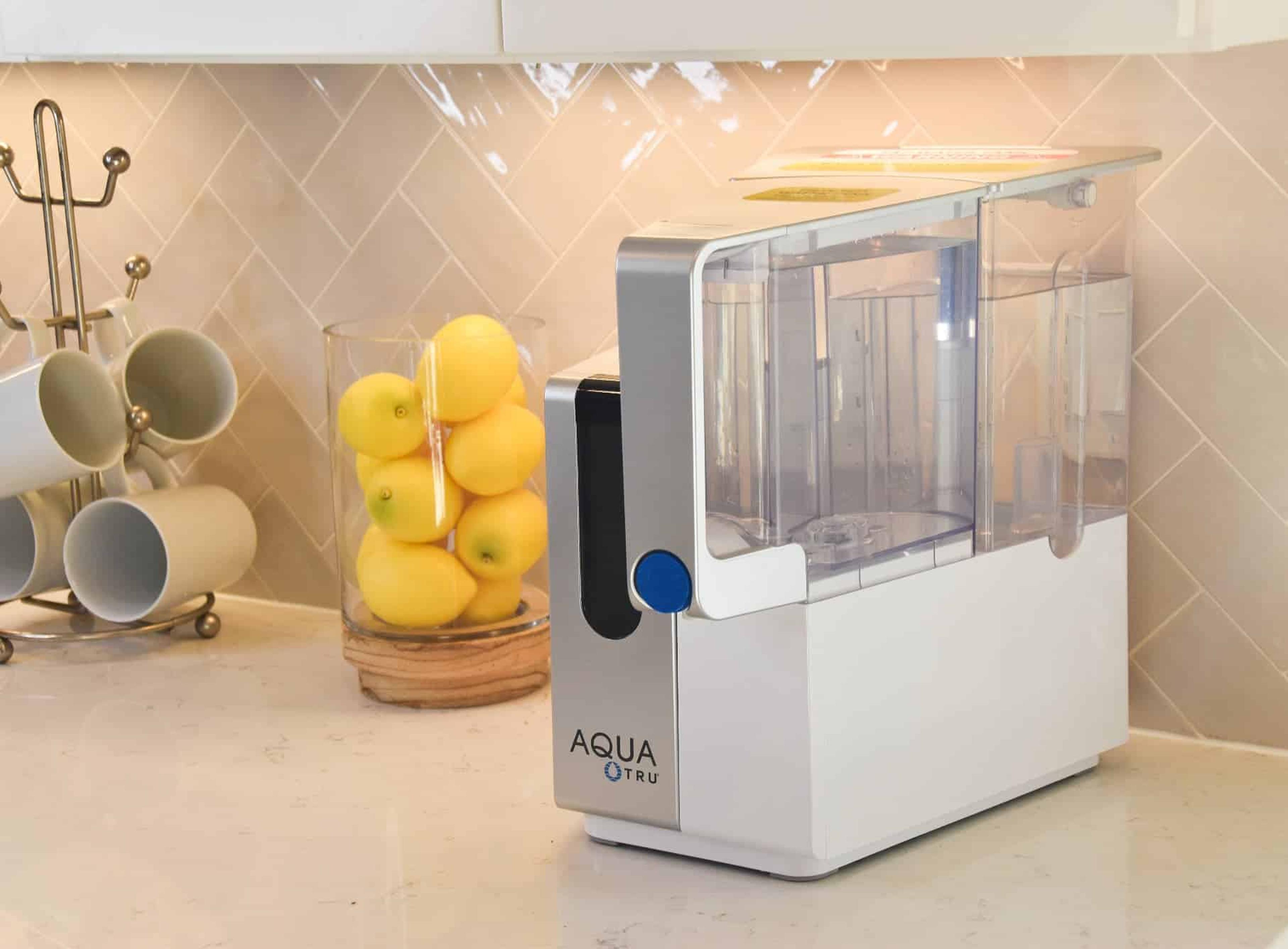
Best overall water filter system: AquaTru
Type: Countertop Reverse Osmosis
Price: $500+ for full system / ~$350 carafe
Removes: Microplastics, PFAS, fluoride, chlorine, heavy metals, VOCs, pharmaceuticals, and more
AquaTru is a high-quality water brand I trust for effective water purification. Certified by IAPMO to NSF/ANSI standards, it removes 84+ contaminants—15 times more than leading pitcher filters—including PFAS, microplastics, lead, chromium, pesticides, radium, rocket fuel, and fluoride. Its filters last 600–1200 gallons, so replacements are only needed every 6 months to 2 years, making it a solid long-term choice despite the higher upfront cost.
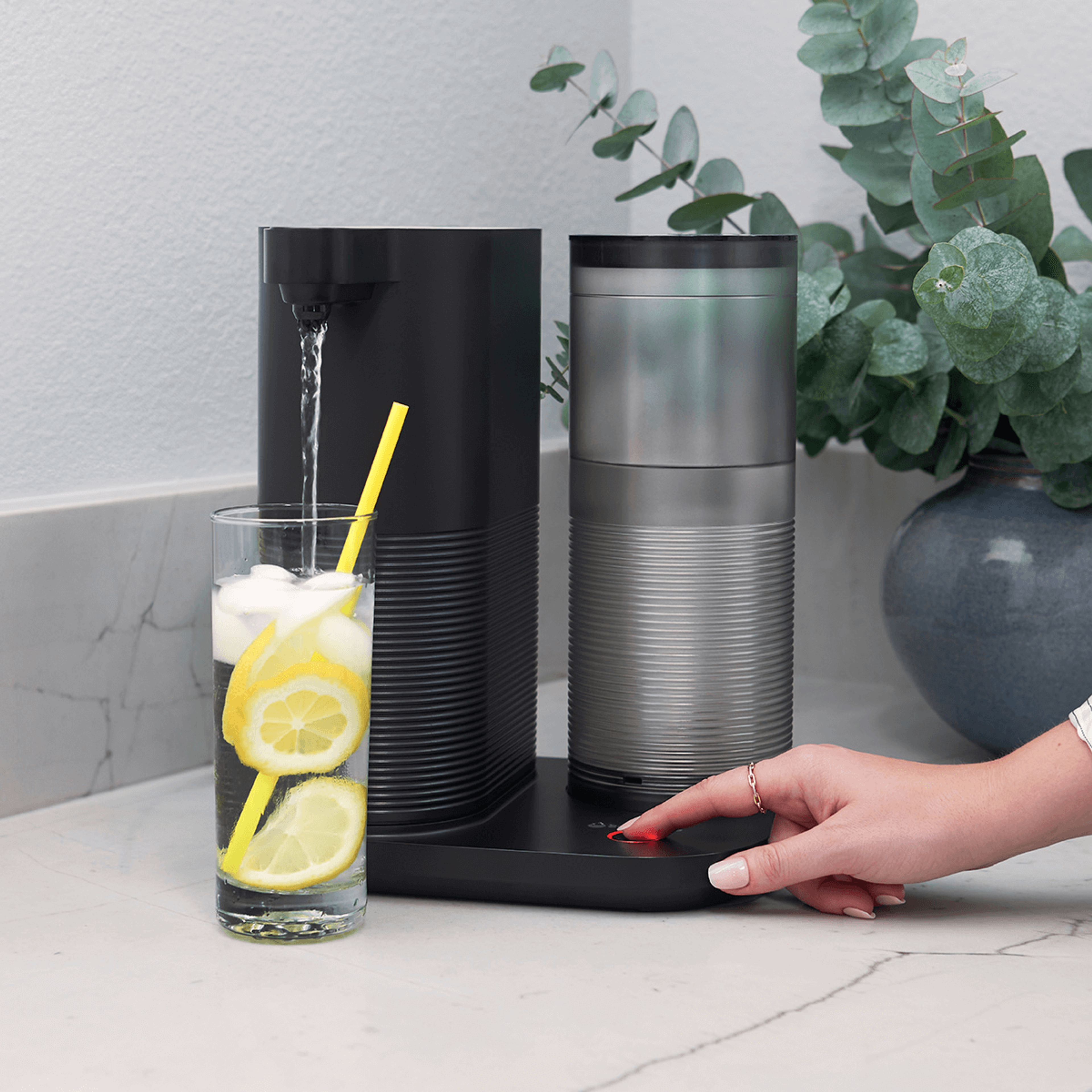
Best countertop water filter system: Aquasana
Type: Clean Water Machine
Price: $400
Removes: Microplastics, PFAS, lead, chlorine, mercury, pesticides, pharmaceuticals, and more
I'm a big fan of the Aquasana Clean Water Machine for families who want clean water at the touch of a button, without the hassle of installation. It filters 78 different contaminants, which is 15x more than your typical Brita-style pitcher. We're talking microplastics (99% removal), PFAS (95%), lead (99%), mercury (96%), plus chlorine, pesticides, and pharmaceuticals. Each filter handles 300 gallons and lasts about 6 months before you need to swap it out. What I really love is how fast it works - just push a button and watch it flow automatically!
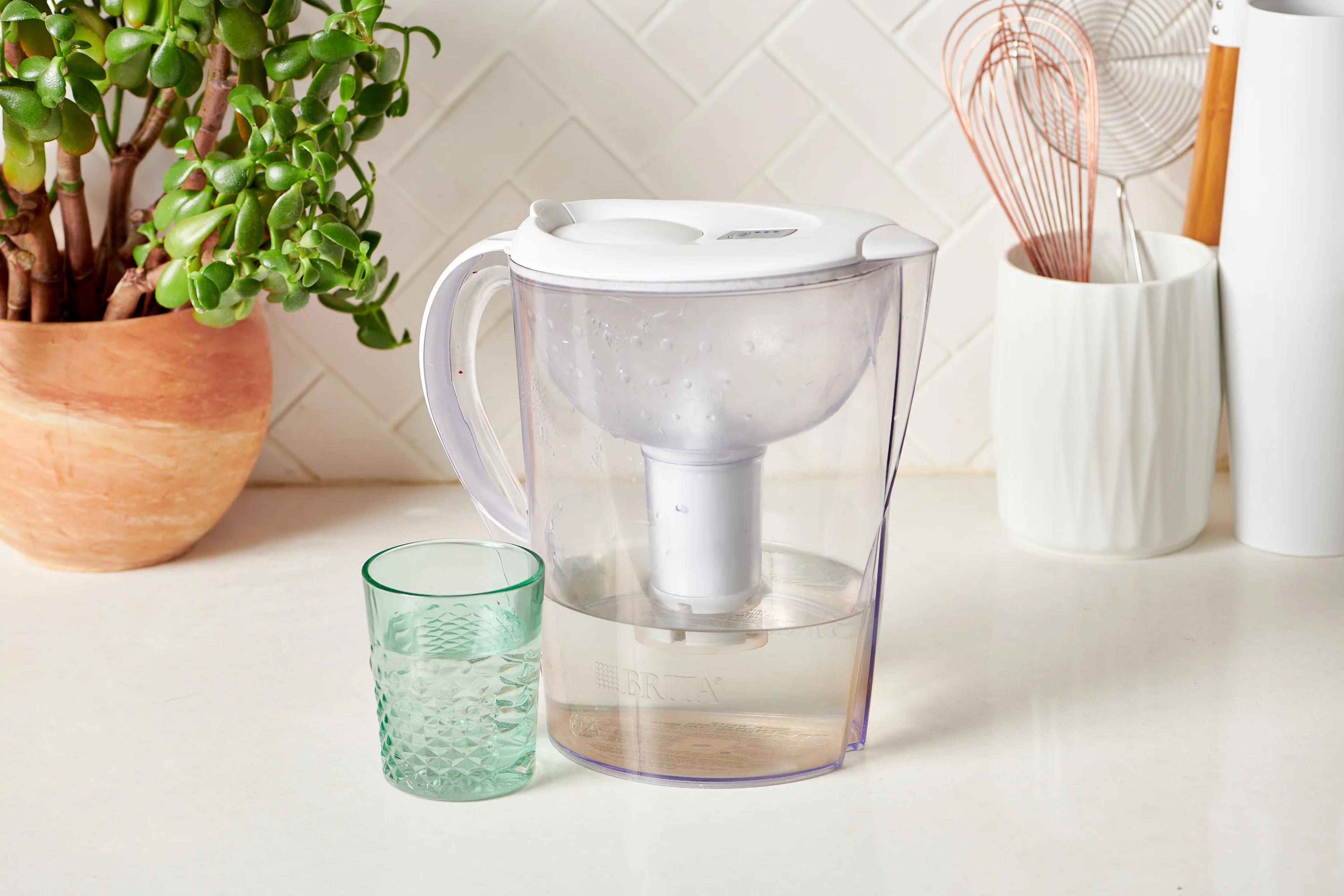
Best pitcher water filter: Clearly Filtered
Types: Pitcher, water bottle
Price: ~$90–100
Removes: 365+ contaminants, including microplastics, PFAS, fluoride, VOCs, lead
Clearly Filtered has been a top water filter company for a while now. I would say they have some of the best all-around pitchers for filtering virtually everything, backed by third-party lab testing. Clearly Filtered makes one of the best all-around pitcher filters, backed by third-party lab testing. Its proprietary Advanced Affinity Filtration Technology removes up to 99.9% of 365+ contaminants, including fluoride, lead, BPA, arsenic, and microplastics, while retaining beneficial minerals. The 100-gallon filters last about four months, and the pitcher is made from medical-grade, BPA-free Tritan plastic that is 100% non-leaching. And, they also make a stainless steel filtered water bottle so you can take clean water with you on the go.
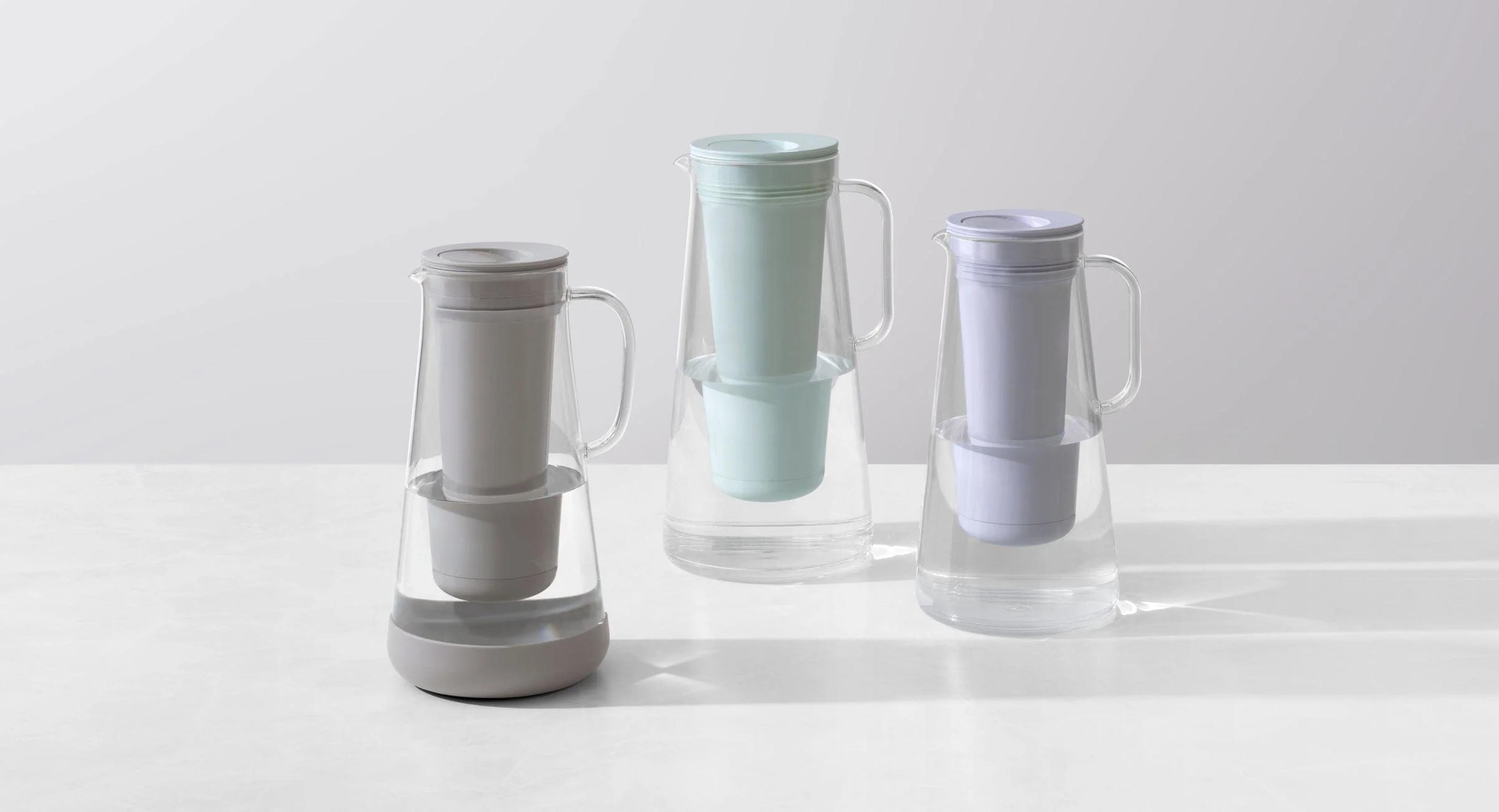
LifeStraw
Type: Pitcher (glass), plastic dispenser, or even filtered water bottles
Price: ~$35–65
Removes: Microplastics, bacteria, parasites, lead, PFAS
Personally, I have been a fan of Lifestraw for years. I have had their stainless steel filter water bottle for years. And I regularly buy these water bottles as gifts – name a better gift than filtered water?! LifeStraw offers affordable, high-quality filtration in pitchers, dispensers, and bottles. Its two-stage system uses a membrane filter (replace yearly) and an activated carbon filter (replace every two months) to remove bacteria, parasites, microplastics, PFAS, chlorine, herbicides, and pesticides while retaining essential (and important) minerals like magnesium and potassium.
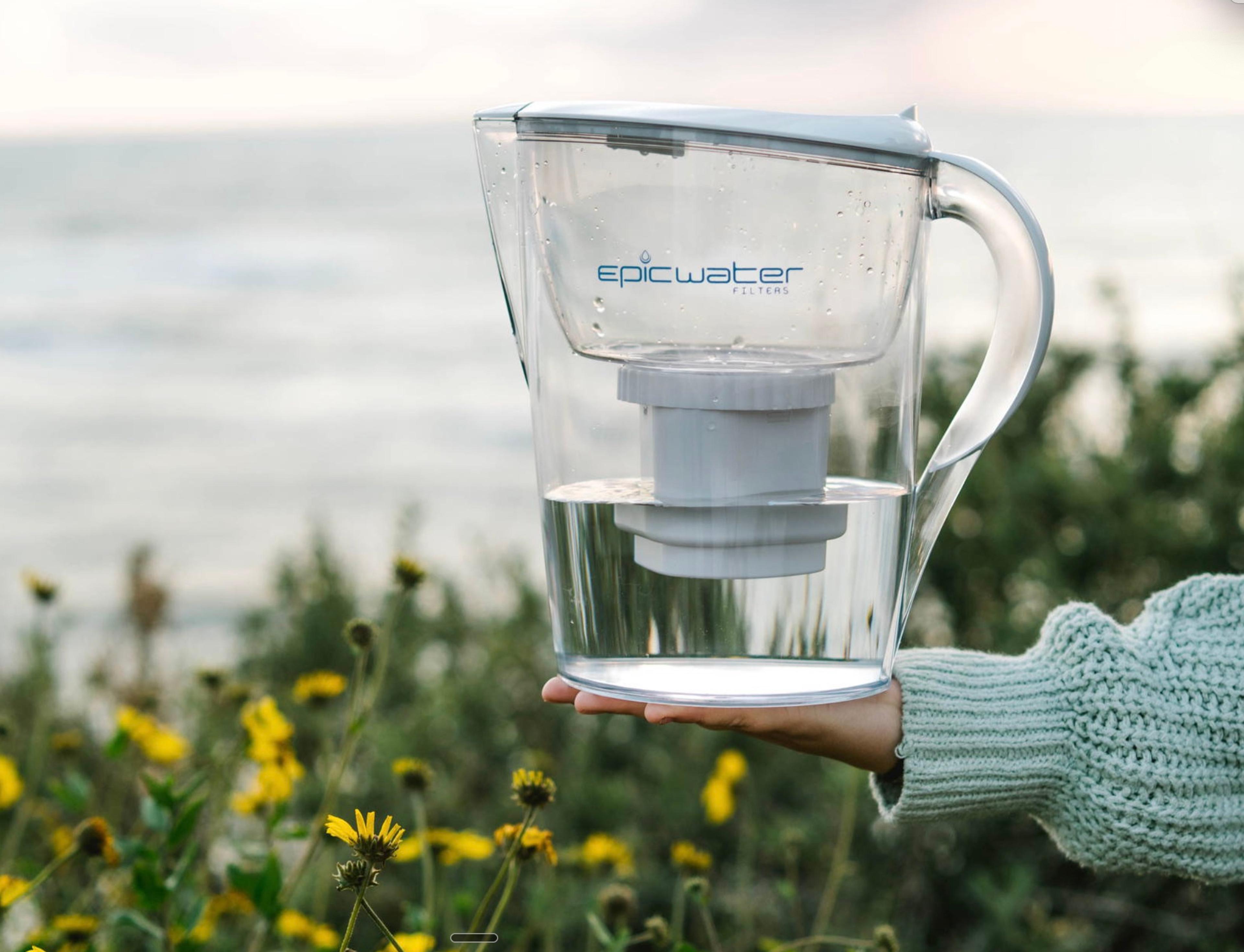
Epic Water
Type: Pitcher, filtered water bottles
Price: ~$45 – $80+
Removes: Microplastics, fluoride, chlorine, heavy metals, forever chemicals
Epic Water products, made in the USA, are designed with an eco-friendly approach using recycled materials. Their carbon block filters remove over 2000% more contaminants than some leading pitchers, including forever chemicals, 1,4-dioxane, total trihalomethanes, chromium-6, fluoride, and chloramines. Pitchers include an LED timer that counts down from 90 days to track filter changes.
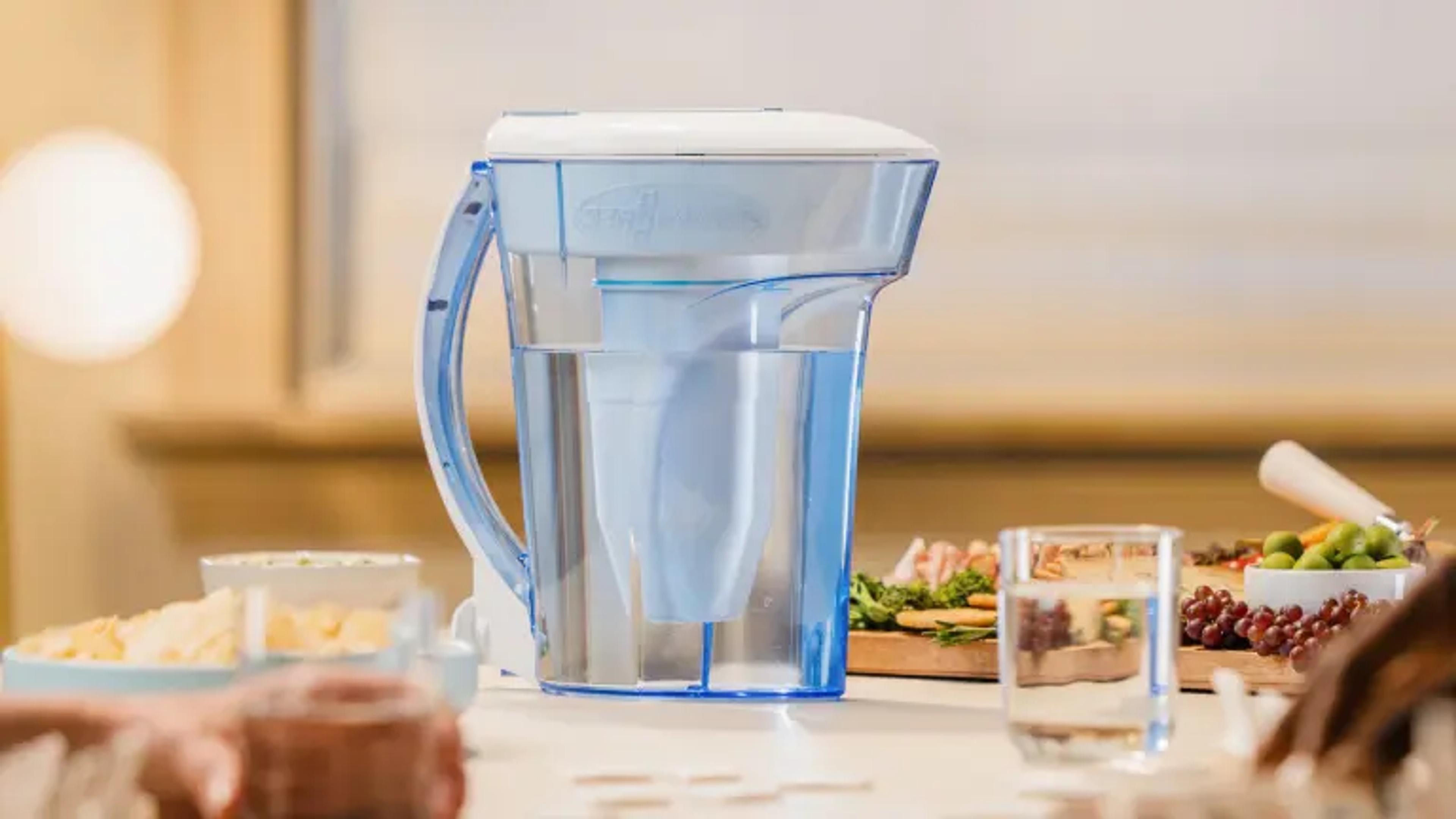
Best budget option: ZeroWater
Type: Pitcher
Price: ~$40+
Removes: Lead, bacteria, chromium, PFAs, and more
I have used ZeroWater in the past and liked it. They are a solid option, especially if you are on a budget. ZeroWater pitchers use a five-stage ion-exchange filtration process to remove virtually all dissolved solids, making them an affordable option for those looking for highly purified water. They are known for their included water quality meter, which lets you test TDS (total dissolved solids) levels before and after filtration to see if the water filtration is actually working!
Top water filters for showers and sinks
You can’t forget about the water that comes from your sinks and showers. While I don’t focus on these as heavily as drinking water, they can still make a difference for your skin and hair.
For showers, I recommend Jolie or AquaBliss. I use AquaBliss myself and have noticed softer, healthier hair since switching - and it’s noticeably cheaper than Jolie. I think it’s fantastic.
For sinks and baths, I like Filterbaby. It mounts directly to your faucet and filters out lead, microplastics, and bacteria. Beyond reducing toxins, these filters can help improve skin health and even reduce acne, according to some evidence.
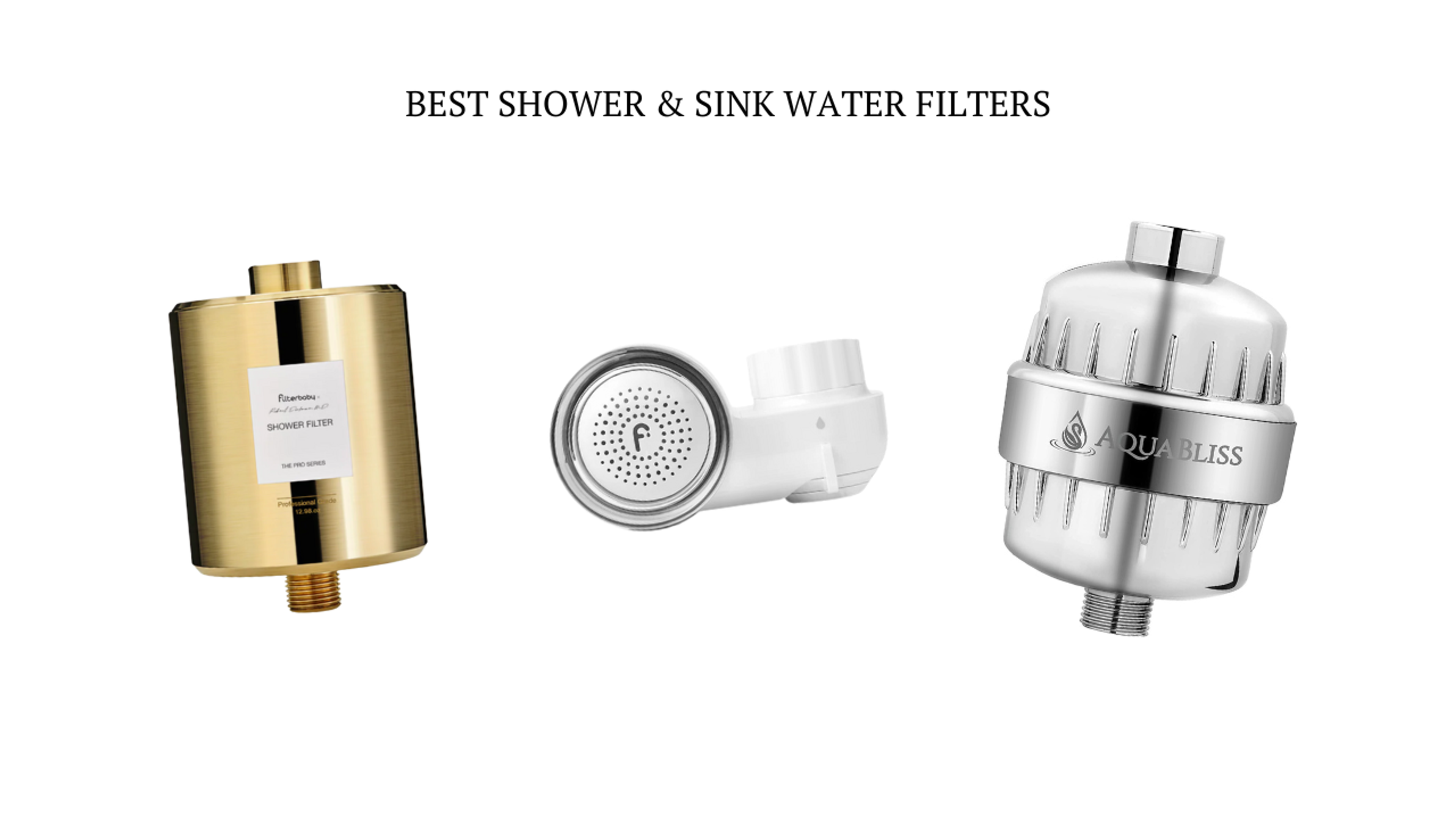
What about whole-house filtration systems?
I haven’t done enough research to give a strong recommendation here. One brand I’ve looked into is Aquasana, but I’ll update once I’ve done deeper testing.
Pro tip: Remove other sources of water toxins
While filtering the water you drink is a great start, water contamination isn’t just the result of contaminated tap water. One of the biggest sources of contamination in your drinking water is actually what you are drinking your water from.
Plastic water bottles are one of the biggest offenders when it comes to microplastic contamination. Scientists estimate that people consumer around 16,000 microplastic particles every year from bottled water alone! Even BPA-free plastics can leach a cocktail of endocrine-disrupting chemicals into your water. To avoid this, invest in glass or stainless steel cups and bottles.
When you’re on the go, look for glass options like Mountain Valley. For babies and kids, there are plenty of great glass baby bottles with silicone sleeves to protect against drops. Stainless steel bottles are another excellent choice for little ones, brands like Owala make durable, kid-friendly options that cut down on plastic exposure.
Cleaning your water, one filter at a time
Of all the products to swap in your home for a healthier, cleaner lifestyle, arguably, filtering your water should be at the top. From your morning glass of water to your nightly shower, clean water matters! Good luck on your journey to find the right water filter for you.
FAQ: Water filters
What’s the best water filter for microplastics?
AquaTru and Clearly Filtered are my top picks. Look for reverse osmosis or ultrafiltration filters, which have pore sizes small enough to remove microplastics and other contaminants.
Do water filters remove microplastics?
Yes, but not all do. Reverse osmosis filters are among the most effective. Ultrafiltration filters are also excellent, and some activated carbon filters can remove smaller particles, especially carbon block filters. All of the brands I have recommended above are solid options for filtering out microplastics from your water.
Does Brita filter out fluoride or microplastics?
No. Brita filters are limited in what they remove and aren’t worth the money if you want serious filtration. They are WAY over-marketed and literally do not filter well at all. Avoid!
What’s the difference between a pitcher and a reverse osmosis system?
A pitcher is simply a water dispenser, while reverse osmosis is a filtration method that forces water through a membrane to remove a wider range of contaminants.
Is it worth getting a shower water filter?
It depends on your health concerns. I personally like all the water that touches my body to be clean, and I’ve found that a good shower filter makes my hair softer and my skin feel better.
Is my tap water safe, even if it tastes fine?
Unfortunately, taste isn’t a good indicator. Water can contain harmful contaminants even if it tastes clean.
Is filtered water the same as distilled water?
No. They are different processes and produce different results. Filtered water has had contaminants removed through a filter, which can leave beneficial minerals intact. Distilled water is boiled into steam and condensed back into liquid, removing almost everything, including things like important and essential minerals, so it’s pure H₂O.
Related articles

Best period underwear: Options for every flow (2026)
Discover the best period underwear for 2026—organic, PFAS-free options that actually work. Research-backed reviews & brands to avoid. Shop safer today!

The best cast iron skillet: Safe, non-toxic cookware that lasts a lifetime
Discover the best cast iron skillet for safe, non-toxic cooking. Compare Lodge, Field Company, and Lancaster (and more). Plus, learn how to season and clean...

Your guide to organic tampons (what to look for & best brands) - 2026
Your period products matter for your long-term health. Choosing organic tampons is one of the best ways to avoid harmful chemicals and additives that may...


